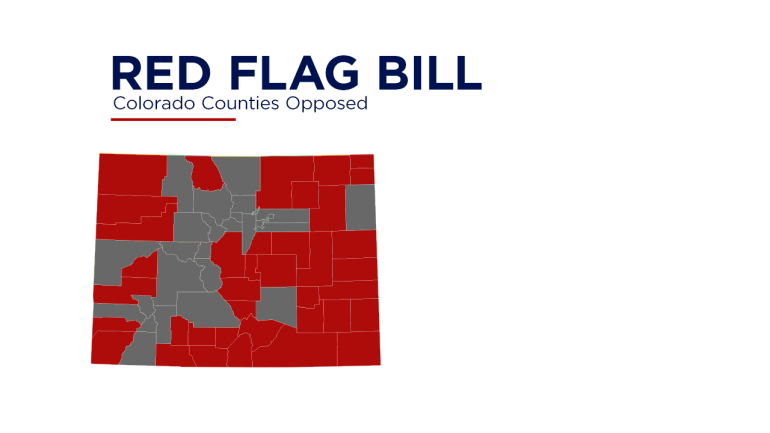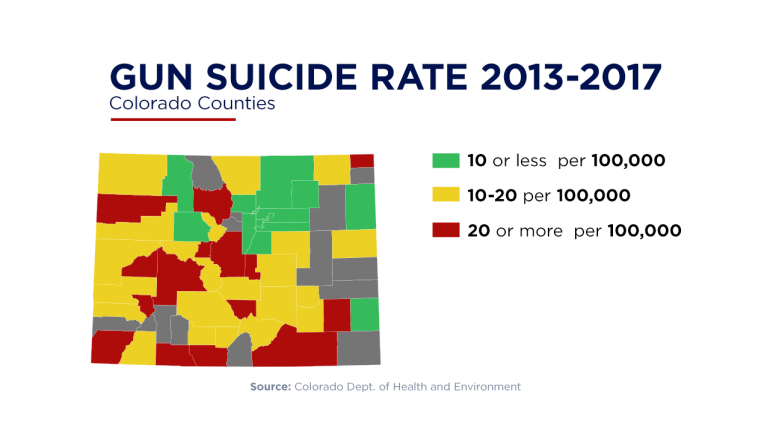DENVER — Supporters of Colorado’s “red flag” law say the measure is more likely to prevent suicides than mass shootings, even though it’s the recent mass shootings in El Paso, Texas and Dayton, Ohio that led President Donald Trump to embrace red flag laws as a way to reduce gun violence.
In Colorado, more than half of the state’s 64 counties have declared themselves Second Amendment sanctuaries opposed to the the red flag law. Many of those counties have the state’s highest gun suicide rates, according to statistics provided to FOX31 by the Colorado Department of Health and Environment.
According to the Centers for Disease Control and Prevention, gun deaths accounted for nearly 40,000 deaths in America in 2017; about 60 percent of those deaths were due to suicide.


It’s one of the reasons why State House District 37 Rep. Tom Sullivan said he authored Colorado’s red flag law.
“This is a case of trying to make gun ownership safer,” he said.
The measure allows courts to temporarily remove guns from anyone deemed a threat to themselves or others.
Sullivan said he’s perplexed that Colorado counties with the highest rates of suicide by gun are more likely to have commissioners who have announced their intention not to enforce the state’s new red flag law.
“Apparently, that’s what those counties are advertising: come out to our counties, you can kill yourselves here. We’re not going to get in your way,” Sullivan said.
Counties with large urban populations like Denver and Boulder tend to have lower rates of suicide by gun: 6.5 deaths per 100,000 people in Denver; 8 per 100,000 people in Boulder between the years of 2013 and 2017. However, Custer County averaged 49 gun suicides per 100,000 people over the same time period.
“It doesn’t surprise me,” said Nancy Van DeMark, the interim president and CEO of Mental Health Colorado. Her organization supported the red flag bill because it believes the measure can reduce suicides. She said there’s a reason many rural counties oppose what is largely meant to be a suicide prevention measure.
“I think the counties where there is higher access to guns, there tends to be less interest in gun restrictions. And also places where there’s higher access to guns, there’s going to be more deaths using weapons,” said Van DeMark.
Supporters of Colorado’s red flag law estimate measure will be used 170 times a year to temporarily take someone’s gun away.
Colorado is one of 17 states to pass a red flag measure but the only state that provides legal counsel at no cost to the gun owner.
Suicide Resources:
National Suicide Prevention Lifeline (800-273-8255): Speak with someone who will provide free and confidential support 24 hours a day, seven days a week. To learn how to help someone in crisis, call the same number.
Colorado Crisis Services Hotline (1-844-493-8255): If you are in crisis or need help dealing with one, call 1-844-493-8255 or text “TALK” to 38255 to speak to a trained professional. When calling Colorado Crisis Services, you will be connected to a crisis counselor or trained professional with a master’s or doctoral degree.
The Trevor Project (1-866-488-7386): A 24/7 resource for LGBT youth struggling with a crisis or suicidal thoughts. The line is staffed by trained counselors.
Colorado Crisis Services Walk-In Locations: Walk-in crisis service centers are open 24/7, and offer confidential, in-person crisis support, information and referrals to anyone in need.
